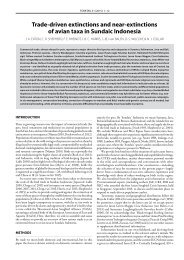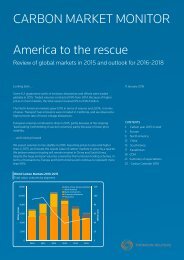Emissions Trading Worldwide
1TbjEHd
1TbjEHd
Create successful ePaper yourself
Turn your PDF publications into a flip-book with our unique Google optimized e-Paper software.
Russian Federation<br />
under consideration<br />
Russia is currently exploring policy options to meet its GHG emissions<br />
reduction target of at least 25% below 1990 levels by 2020<br />
and 25–30% below 1990 levels by 2030.<br />
In 2014, the Russian government adopted a plan for the development<br />
and implementation of emissions reductions activities.<br />
The plan includes the development and introduction of an MRV<br />
system at the company level, assessment of emissions reduction<br />
potentials, and the development of a concept and action plan to<br />
reach the emissions reduction targets by 2020 and 2030, which<br />
could potentially include emissions trading.<br />
Building on this, Russia has started to build up the legal<br />
basis to enable GHG monitoring at the company level. In 2015,<br />
the Government adopted the Concept on MRV. The methodological<br />
guidelines for GHG emissions assessment on a corporate<br />
and regional level were also adopted by the Ministry of Natural<br />
Resources and Ecology. The draft amendment of the Law on<br />
Environmental Protection was also published and made available<br />
for public comment. The revised Law will be submitted to the<br />
Parliament for their consideration. The draft would create a legal<br />
basis for the government to list the types of GHG that will be regulated<br />
in the future and set rules for the MRV of GHG emissions on<br />
a company level.<br />
background information<br />
Overall Ghg <strong>Emissions</strong> (excl. LULUCF): 2,295 MtCO 2 e (2012)<br />
OVERALL GHG EMISSIONS BY SECTOR<br />
MtCO 2 e<br />
7.9 %<br />
6.3 %<br />
3.7 % 71.6 %<br />
10.5 %<br />
Industrial processes, solvent and<br />
other product use (181.7)<br />
agriculture (144.2)<br />
waste (84.0)<br />
Energy (excl. transport) (1643.9)<br />
Transport (241.3)<br />
GHG Reduction Target By 2020: At least 25% reduction from 1990 GHG levels.<br />
By 2030: 70–75% reduction from 1990 GHG levels (INDC Submission).<br />
Turkey<br />
under consideration<br />
In April 2012, Turkey adopted a new regulatory framework for a<br />
comprehensive, mandatory MRV system. Monitoring started in<br />
2015 and reporting began (of 2015 emissions) in 2016.<br />
As an implementing country under the PMR, Turkey received<br />
funding in May 2013 to help implement the MRV regulation by<br />
introducing a pilot MRV system in the energy, cement and refinery<br />
sectors, and to explore options for market-based instruments.<br />
This includes a series of analytical reports on using emissions<br />
trading and other market-based instruments for the MRV sectors.<br />
Turkey is also a candidate to EU accession and thereby aims<br />
to complete the environmental obligations of the EU accession<br />
(including the EU ETS directive).<br />
background information<br />
Overall Ghg <strong>Emissions</strong> (excl. LULUCF): 459.1 MtCO 2 e (2013)<br />
OVERALL GHG EMISSIONS BY SECTOR<br />
MtCO 2 e<br />
GHG Reduction Targets Turkey is not listed in Annex B of the Kyoto Protocol<br />
and has no mandatory GHG reduction target under the UNFCCC. By 2030: Up<br />
to 21% reduction from the BAU scenario (INDC Submission).<br />
compliance<br />
MRV The Turkish MRV legislation establishes an installation-level system for<br />
CO 2 emissions for roughly 1,000 entities. Sector coverage includes the energy<br />
sector (combustion fuels >20MW) and industry sectors (coke production, metals,<br />
cement, glass, ceramic products, insulation materials, paper and pulp,<br />
chemicals over specified threshold sizes/production levels).<br />
Entities had until October 2014 to submit their first monitoring plans and will<br />
submit verified emissions reports by 30 April 2016 to the Ministry of Environment<br />
and Urbanization. Verifiers will be accredited by the Turkish Accreditation<br />
Organization after 2017. During 2016–2017, the Ministry of Environment and<br />
Urbanization will provide training, examination and licensing services.<br />
Enforcement Entities that fail to comply with the Turkish MRV regulation<br />
are subject to the generic data reporting requirements and related sanctions<br />
under the Turkish Environmental Law No. 2872.<br />
15.7 %<br />
10.8 %<br />
10.1 % 68 %<br />
11.4 %<br />
Industrial processes (72.0)<br />
agriculture (49.8)<br />
waste (26.0)<br />
Energy (excl. transport) (311.2)<br />
Transport (48)<br />
other information<br />
Institutions involved Ministry of Environment and Urbanization and further<br />
ministries.<br />
36




